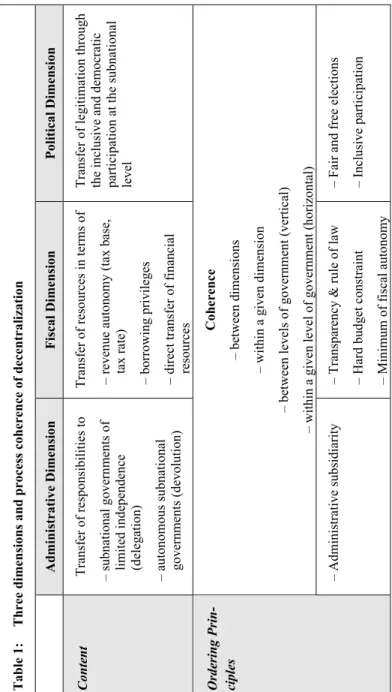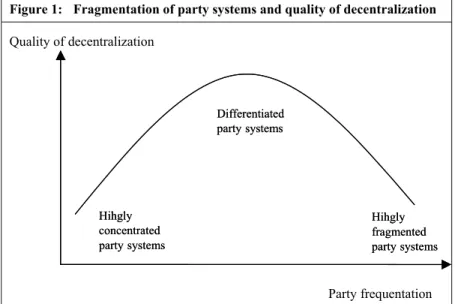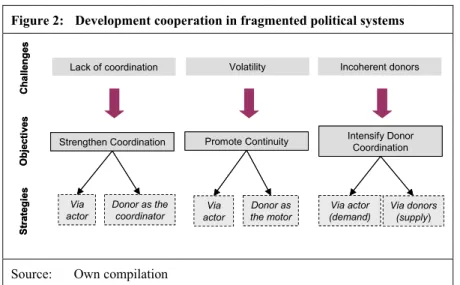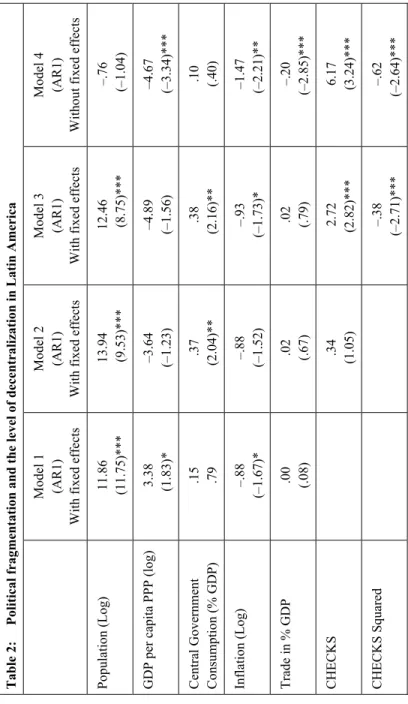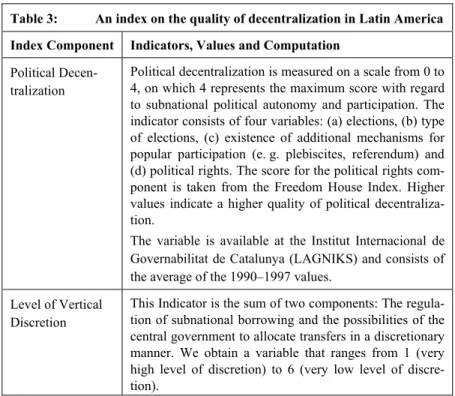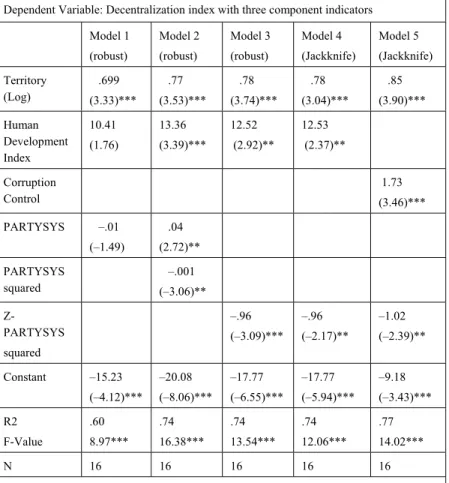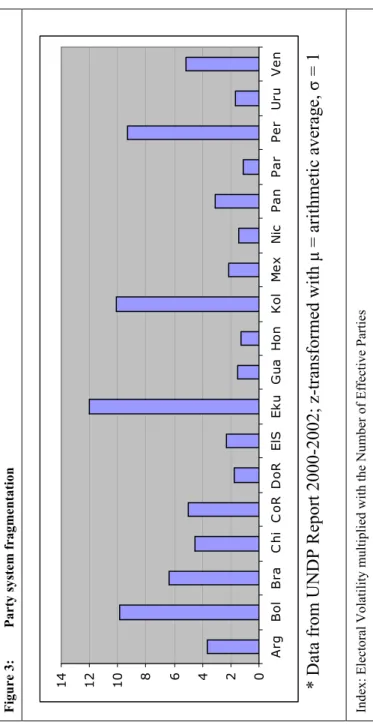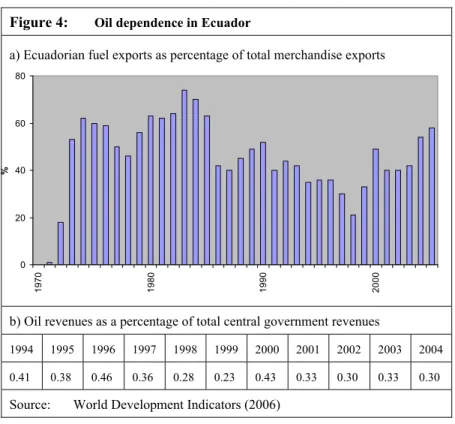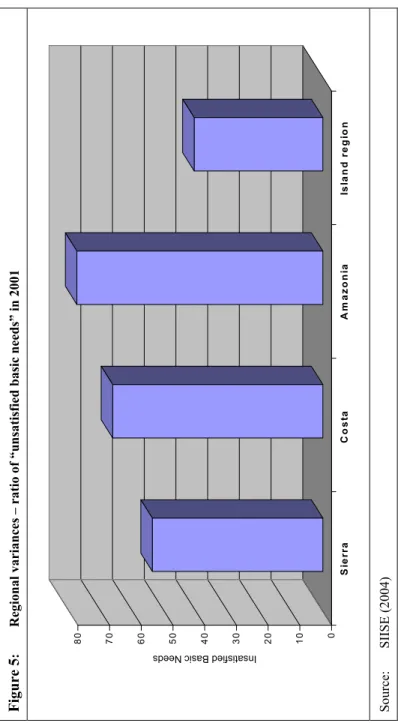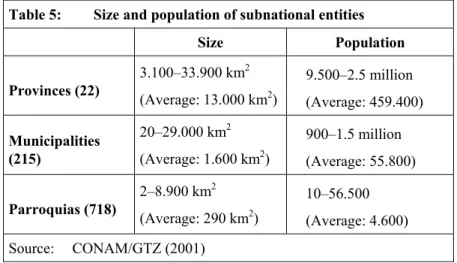and Development Cooperation
Jörg Faust Florian Arneth Nicolaus von der Goltz Imke Harbers
Judith Illerhues Michael Schloms
Ecuador in the Latin American Context
Development Cooperation
The DIE is a multidisciplinary research, consultancy and training institute for German and multilateral development policy. It advises public institutions in Ger- many and throughout the world on current aspects of cooperation between indus- trialized and developing countries on the basis of independent research. The DIE trains German and other European university graduates for professional work in development policy.
Jörg Faust, German Development Institute, Bonn Florian Arneth, KfW Entwicklungsbank, Frankfurt
Nicolaus von der Goltz, Federal Ministry for Economic Cooperation and Devel- opment, Berlin
Imke Harbers, Institute for Political Science, Leiden University Judith Illerhues, Friedrich Ebert Foundation, Bonn
Michael Schloms, Federal Ministry for Economic Cooperation and Development, Bonn
Political Fragmentation, Decentralization and Development Cooperation
Ecuador in the Latin American Context
Final Report of the Country Working Group Ecuador
Jörg Faust Florian Arneth Nicolaus von der Goltz Imke Harbers
Judith Illerhues Michael Schloms
Bonn 2008
33
Studies / German Development Institute ISSN 1860-0468
Political fragmentation, decentralization and development co- operation : Ecuador in the Latin American context ; final report of the Country Working Group Ecuador / Jörg Faust … – Bonn : DIE, 2008. – (Studies / German Development Institute ; 33)
ISBN 978-3-88985-361-5
© Deutsches Institut für Entwicklungspolitik gGmbH Tulpenfeld 6, 53113 Bonn
℡ +49 (0)228 94927-0 +49 (0)228 94927-130 E-mail: die@die-gdi.de http://www.die-gdi.de
Decentralization reforms have been among the most important aspects of state modernization in developing countries. From a normative perspec- tive, such reforms are expected to promote economic development and democratization. Unfortunately, however, the course of real decentraliza- tion processes has often been incoherent and defective. In this context, this study analyses the challenges for successful decentralization in fragmented polities focusing on Latin America and the special case of Ecuador. Based on a political economy perspective on decentralization, we attempt to show, how political fragmentation has affected decentralization. From there, we develop criteria on how development assistance can at least partly counter the negative effects of political fragmentation. Finally, we analyse to which extend donor agencies have been pursuing such strategies in Ecuador.
This study is the result of a research project, which has been carried out at the German Development Institute (DIE) in 2004 and 2005 as part of the DIE Post-Graduate Training Course for young professionals. Field re- search was conducted from February to April 2004. The research project was carried out in close cooperation with the Facultad Latinoamericana de Ciencias Sociales (FLACSO) in Quito Ecuador, which supported the pro- ject from its early stages. Among many FLACSO members, who gave advice and valuable comments on different part of the study’s content, the authors especially thank Santiago Ortiz, who has intellectually and logisti- cally supported the project from its beginning. Many thanks also go to the GTZ program on decentralization in Ecuador. Janos Zimmermann and his team provided us with many valuable insights about the decentralization process in Ecuador and development cooperation’s attempts to foster sub- sidiarity oriented state structures.
We also profited much from different presentations of the study’s prelimi- nary results at FLACSO in Quito and at the Interamerican Development Bank and the World Bank in Washington, where the respective staff mem- bers constructively commented our findings. In Bonn, our colleagues at the DIE also offered useful comments and constructive criticism. Special thanks go to Matthias Krause, Tilman Altenburg and Oliver Schlumberger.
Finally, we would like to thank Gisela Kuhlmann, without whose skills and patience, the technical process of editing this study would never have come to an end.
Acronyms and Abbreviations
Executive Summary 1
1 Introduction 13
2 Conceptual framework: decentralization, collective action and development
cooperation 21 2.1 Normative considerations about successful
decentralization 21 2.1.1 Direct and indirect objectives of “good”
decentralization 21 2.1.2 The three dimensions of decentralization 24
2.1.3 Coherence and incoherence in decentralization
processes 28 2.2 Explaining empirical variance: collective
choice and decentralization 33 2.2.1 Context, actors and decentralization 33 2.2.2 Collective action and the challenges of
decentralization 35 2.2.3 Organizing the encompassing interest of
coherent decentralization 37 2.2.4 Two hypotheses at the level and the quality of
decentralization 42 2.3 Decentralization and development cooperation
in fragmented polities 46
3 Cross country evidence and the case of
Ecuador 58 3.1 Testing the inverse U-effect in the Latin
American context 58
3.2 Ecuador in the Latin American context 69
4 Decentralization in Ecuador 72 4.1 Temporary, structural and institutional context 72 4.1.1 Temporary context factors 72 4.1.2 Structural context factors 78 4.1.3 Institutional context factors 82 4.2 Advances and defects of decentralization in
Ecuador 88
4.2.1 Historical overview 88
4.2.2 The shape of the decentralization process in
Ecuador 97
4.2.2.1 The coherence of Ecuador’s decentralization
process 98
4.2.2.2 The administrative, fiscal and political
dimension of decentralization 105 4.3 An actor-centered analysis of decentralization
in Ecuador 110
4.3.1 Actors and decentralization 111 4.3.2 Main defects of decentralization 121
5 Development cooperation and decentrali-
zation in Ecuador 144
5.1 Coordinating decentralization 144 5.1.1 Strengthening coordination capacities 144
5.1.2 Development cooperation as a coordinator
of decentralization 150
5.2.1 Strengthening motors of decentralization 159 5.2.2 Development cooperation as a motor of
decentralization 161
5.3 Donor coordination 166
5.3.1 Strengthening a coherent demand 167 5.3.2 Strengthening a coherent supply 172
6 Conclusions and recommendations 179
Bibliography 189
List of Interviewees 200
List of Meetings 204
Annex 205
Resumen en Español 209
List of Boxes
Box 1: Milestones of Ecuador’s decentralization process 94 Box 2: Incoherence between financial and administrative
decentralization 102
Box 3: Fragmentation of political discourses on
decentralization 123
Box 4: Partial attempts to overcome problems of incoherence 139 Box 5: Providing support to the decentralization unit of PRIAN 148
Box 6: The case of Cotacachi 153
Box 7: Coordination efforts of German aid agencies 175
List of Figures
Figure 1: Fragmentation of party systems and quality of
decentralization 46
Figure 2: Development cooperation in fragmented political
systems 52
Figure 3: Party system fragmentation 70
Figure 4: Oil dependence in Ecuador 76
Figure 5: Regional variances – ratio of “unsatisfied basic needs”
in 2001 80
Figure 6: Governance indicators for Latin American
countries (2002) 84
Figure 7: Trust in political institutions in Latin America 86 Figure 8: Composition of municipal and provincial revenues 108
Table 1: Three dimensions and process coherence of decentra-
lization 32
Table 2: Political fragmentation and the level of decentralization in
Latin America 61
Table 3: An index on the quality of decentralization in Latin
America 64
Table 4: Party systems and the quality of decentralization in Latin
America 68
Table 5: Size and population of subnational entities 81 Table 6: Political parties and fiscal transfers in Ecuador,
2001–2004 130
Table 7: Explaining subnational variance with regard to
administrative decentralization 134
Acronyms and Abbreviations
AECI Agencia Española de Cooperación Internacional AME Asociación de Municipalidades del Ecuador BEDE Banco de Estado de Ecuador
ARD3D Associates in Rural Development – Decentralization, De- mocracy and Development
BID Banco Interamericano de Desarrollo
BMZ Bundesministerium für wirtschaftliche Zusammenarbeit und Entwicklung (German Ministry of Economic Coopera- tion and Development)
BTC Belgische Technische Coöperatie CAF Cooperación Andina de Fomento CASI Consejo Asesor de la Cooperación
CEPAL Comisión Económica para América Latina y el Caribe (Economic Commission for Latin America and the Caribbean)
CFP Concentración de Fuerzas Populares
CIM Centrum für Internationale Migration und Entwicklung CONAIE Confederación de Nacionalidades Indígenas del Ecuador CONAJUPARE Consorcio de Juntas Parroquiales Rurales del Ecuador CONAM Consejo de Modernización Nacional
CONCOPE Consorcio de Consejos Provinciales de Ecuador CONESUP Consejo Nacional de Educación Superior CORDES Corporación de Estudios para el Desarrollo
COSUDE Coopération Suisse pour le Développement (Agencia Suiza para el Desarrollo y la Cooperación)
CTB Coopération Technique Belge DAC Development Assistance Committee DANIDA Danish Development Agency
DED Deutscher Entwicklungsdienst (German Development Ser- vice)
DEZA Direktion für Entwicklung und Zusammenarbeit (Swiss Development Agency)
DFID Department for International Development
DP Democracia Popular
DPUDC Democracia Popular – Unión Demócrata Cristiana ECORAE Instituto para el Ecodesarrollo de la Región Amazónica
EU European Union
FLACMA Federación Latinoamericana de Ciudades, Municipios y Asociaciones
FLACSO Facultad Latinoamericana de Ciencias Sociales FODESEC Fondo Desarrollo Seccional
FONDEPRO Fondo de Desarrollo Provincial GDP Gross Domestic Product
GTZ Deutsche Gesellschaft für Technische Zusammenarbeit (German Agency for Technical Cooperation)
HDI Human Development Index
HSS Hanns Seidel Foundation
IADB Inter-American Development Bank
ID Izquierda Democrática
IDT Index of Territorial Distribution IEE Instituto de Estudios Ecuatorianos IIG Instituto Internacional de Gobernabilidad IMF International Monetary Fund
INECI Instituto Ecuatoriano de Cooperación Internacional InWent Internationale Weiterbildung und Entwicklung GmbH KAS Konrad Adenauer Foundation
KfW Kreditanstalt für Wiederaufbau
LAGNIKS Latin American Governance Network Information and Knowledge System
MDG Millennium Development Goals MEF Ministry of Economy and Finance
MITA Movimiento Indígena de Tungurahua sede Ambato MPD Movimiento Popular Democrático
MUPP Movimiento de Unidad Plurinacional Pachakutik NPE Nueva Economía Política
NGO Non-Governmental Organization ODA Official Development Assistance ODI Overseas Development Institute
OECD Organisation for Economic Cooperation and Development PACHAKUTIK Movimiento de Unidad Plurinacional Pachkutik – Nuevo
País
PDM Programa de Desarrollo Municipal
PL Partido Libertad
PRE Partido Roldosista Ecuatoriano
PRIAN Partido Renovador Independiente Acción Nacional PROMACH Proyecto de Manejo de Cuencas Hidrográficas PROMODE Programa de Modernización y Descentralización PRSP Poverty Reduction Strategy Paper
PSC Partido Social Cristiano
PS-FA Partido Socialista – Frente Amplio PSP Partido Sociedad Patriótica 21 de enero RDO Regional Development Organizations
SENPLADES Secretaría Nacional de Planificación y Desarrollo SIISE Sistema Integral de Indicaciones Social del Ecuador SNV Stichting Nederlands Vrijwilligers (Netherlands Develop-
ment Cooperation)
SSP Sector Strategy Paper (Schwerpunktstrategiepapier) UBNI Unsatisfied Basic Needs Index
UDyEE Unidad de Descentralización y Estructura del Estado (CONAM)
UNCT United Nations Country Team in Ecuador UNDP United Nations Development Programme UN-HABITAT United Nations Human Settlements Programme UN-UNO Partido Unión Nacional
USAID US Agency for International Development
WB World Bank
WBI World Bank Institute
Executive Summary
Even if the collection of empirical evidence for this study was completed already in 2005, we believe that our findings are still of substantial rele- vance for understanding decentralization processes in Latin American and for organizing effective strategies for external assistance in the field of state modernization. Thus, the following paragraphs will shortly introduce our major conclusions from a more aggregated perspective.
The purpose of this study is twofold. First, we attempt to advance the knowledge about the origins of defective decentralization. Second, we attempt to use these newly gained insights for analyzing aid agencies’
attempts to promote decentralization.
Using quantitative and qualitative methods of enquiry, we show with evi- dence from Latin America and especially from Ecuador that political fragmentation leads to severe deficiencies of decentralization processes.
Political fragmentation thus seriously constrains the emergence of a coher- ent and subsidiarity-oriented state structure. Our econometric comparison of Latin American democracies demonstrates, that the level and the quality of decentralization have been negatively affected in political environments characterized by high amounts of veto-players and fragmented party sys- tems. The Ecuadorian case study reveals in detail, how political fragmen- tation fostered defective decentralization respectively strong incoherencies among the political, fiscal and administrative dimension of decentraliza- tion. Beyond, our analysis of aid agencies’ attempts to promote decentrali- zation in Ecuador also resembles important features of the current debate on aid effectiveness. We conclude with three major recommendations for aid agencies, which attempt to promote decentralization and state mod- ernization in fragmented polities.
• First, seriously advancing donor coordination and harmonization should be a priority in fragmented polities. If the donor setting itself is characterized by fragmentation, it will add further centrifugal tenden- cies to the decentralization process instead of providing more coher- ency.
• Second, donors should attempt to implement multi-level strategies, which attempt to connect the political dynamics on different levels of government: the national, the regional and the local level. Advancing a coherent modernization process only from below is as illusive as at-
tempting to reform only from above without getting systematic feed- back from subnational entities.
• Finally, fragmented polities come along with “fragmented ownership“
and in some cases with no ownership at all. If ownership is absent, aid agencies should consider an exit-strategy. If key players, however, are interested in advancing reform but consensus building is constrained by political fragmentation, external consultancy can help to organize a col- lective reform strategy. This generally requires a long term oriented, it- erative and inclusive consultancy process and a flexible donor ap- proach.
Why decentralization?
From a normative political perspective, decentralization aims at bringing state services closer to the citizen in order to deepen democratic legitimacy and political transparency. In addition, subnational entities should enjoy high levels of fiscal and administrative autonomy in order to compete among each other for investment and human capital. Increased fiscal and administrative maneuvering at the subnational level does not only limit discretionary attempts of the central state to politically allocate financial resources and administrative responsibilities. Additionally, sustainable competition also fosters policy innovation and imitation among subna- tional entities, thereby promoting socioeconomic development.
Yet, successful decentralization also has to take into account that several competences have to be kept at the centre to prevent “market failure” of subnational competition. For instance, central governments need strong fiscal responsibilities, oriented at preventing subnational governments from becoming excessively indebted. Central governments also have the important task of guaranteeing the free flow of capital and human re- sources within the national territory and to organize at least a subsidiarity- oriented framework for all kind of social policies.
Thus, decentralization processes should follow the principle subsidiarity.
Subsidiarity as a guiding principle of state structures, that fosters eco- nomic development and political legitimacy is highly accepted among scholars and political practitioners. However, it is a normatively and em- pirically highly debated issue, which concrete issues fall under the domain of the central government and which areas are to be governed by subna- tional entities. In fact, there is no blueprint for all societies drawing the
normatively “correct” lines between national, regional and local responsi- bilities.
How does politics cause deficiencies of decentralization processes?
While in many countries, especially in Latin America, decentralization processes have advanced significantly, most decentralization processes have been plagued with different kind of deficiencies. In most cases, these deficiencies have also political origins because decentralization as a proc- ess of deep institutional transformation of state structures has a strong political component.
There is little doubt, that subsidiarity oriented decentralization has little room to prosper under autocratic rule because the autocratic elite will have little interest to give away part of its privileges and promote potential opposition at the subnational level.
However, decentralization may also confront serious difficulties under democratic rule. In many emerging democracies reform processes have often failed to follow the basic principles of subsidiarity in a coherent manner. In Latin America, the following deficiencies have been among the most common challenges for subsidiarity-oriented decentralization.
• Increased political and fiscal autonomy of subnational governments has often weakened national governments’ capability to impose credible budget constraints. This, in turn, often has provoked excessive debt levels at the subnational level, subsequently being followed by a “trans- fer” of such debt to the national level.
• Incoherence among different dimensions of decentralization has often characterized decentralization processes. In many countries the distri- bution of administrative competences among different levels of gov- ernment remains unclear, which makes it extremely difficult to provide an appropriate distribution of fiscal competences and resources.
• The opaque mixture of administrative and fiscal decentralization re- duces the accountability of political leaders at the national and subna- tional levels and therefore works in favor of traditional clientelism.
• Fiscal decentralization is still strongly based on fiscal transfers, while own revenues at the subnational level have remained low. This has sus- tained vertical dependency of subnational entities and reinforced exist- ing problems of low accountability and low transparency.
Often, the lack of administrative capacities and knowledge existing at many subnational entities is made at least partly responsible for these shortcomings. However, while the lack of administrative capacities is a serious shortcoming, a political economy framework can better explain most deficiencies. From such a perspective, the distribution and coordi- nation problems of decentralization are responsible for most deficiencies.
Organizing a coherent decentralization process, where political, adminis- trative and fiscal decentralization are crafted in a consistent manner is difficult, because most actors involved follow rather special interests in- stead of promoting the broader goal of a coherent and subsidiarity oriented process. Because decentralization encompasses all state levels, several conflict lines might obstruct the process.
• Probably, the most prominent conflict line is between different levels of government. As subnational governments in Latin America are elected in democratic elections, the struggle between different levels of government centers on the distribution of resources and competences.
• Conflicts between levels of government are supplemented by conflicts among actors at the same state level. At the national level, conflicts be- tween different ministries are usual when it comes to craft transfer sys- tems and the distribution of administrative competences. The existing heterogeneity among subnational entities, for instance with regard to size and economic development, also creates strong conflicts.
• Finally, the notion that civil society groups automatically pursue collec- tive interests is rather naïve. This is not to say, that civil society groups have no role in increasing participation and transparency, at least at the subnational level. Often, however, local communities have been led by leaders dependent on vertical structures of clientelistic networks, whose potential as subnational democratizers is consequently limited. Addi- tionally, powerful social groups at the national level, such as labor un- ions, have often played an obstructive role in decentralization proc- esses.
How does political fragmentation affect decentralization?
State actors from and within different levels of government often follow conflicting interests with regard to decentralization, which leads to serious collective action problems. Thus, one must ask, which political actors could organize a more coherent process?
Civil society is only to a limited extend capable of bringing together di- verging interests. The important function of a vivid civil society consists in articulating the political concerns of citizens rather than aggregating these interests into consistent political strategies. Instead, the aggregation of interests in representative democracy is the central task of political parties.
Especially in decentralization processes, where central governments pur- sue their own special interests, political parties have a crucial role as po- tential organizers of more coherent decentralization. As political parties should play an important role on each level of government and party elites will include successful politicians from each level, party structures seem to be the most adequate place to develop coherent strategies of decentraliza- tion.
Unfortunately, many Latin American party systems are ill equipped for such a demanding task because they are experiencing a problematic pro- cess of fragmentation. When party systems split into many small organiza- tions, each party will represent a rather small percentage of sector- or region-specific interests, thereby losing its capacity to provide coherent strategies for decentralization. If relatively small parties are characterized by hierarchical and traditional Caudillo-structures impeding intra-party democracy, these organizations will be even less likely to take over the role of organizers of a coherent respectively successful decentralization process. Consequences of such fragmented polities are rather volatile governments, which are built on fragile coalitions in parliament. As the executive is not based on a programmatic majority, which has defined at least some common core policy contents, policies will be over proportion- ally guided by special interest politics.
In two quantitative exercises of our studies we support these claims with empirical evidence. We show that there is an inverse-u relation between the number of veto-players respectively party system fragmentation on the one hand and the level respectively quality of decentralization on the other hand. Thus, two extreme actor-constellations are unfavorable settings for advancing subsidiarity-oriented state structures: For instance, polities characterized by only one veto-player or one dominant party normally show strong autocratic features, which in turn tend to obstruct decentrali- zation. On the other extreme, polities fragmented into too many veto- players respectively political parties will also be confronted with serious deficiencies concerning decentralization. While these kinds of policies
might reach a certain level of decentralization, they probably face high level of incoherency among the different dimensions of decentralization.
In our in depth analysis of Ecuador, we provide case-study evidence of the latter by identifying and analyzing the deficiencies of the Ecuadorian de- centralization process.
On the one hand, decentralization in Ecuador has not stood still since re- democratization and has advanced since the end of the 1970s. On the other hand, however, these dynamics with regard to political and fiscal decen- tralization have been uneven and erratic so that the overall process can be described as defect. Fiscal decentralization has been characterized by low fiscal autonomy and subnational entities’ ongoing dependence on a com- plex and sometimes opaque transfer system. Administrative decentraliza- tion has proceeded in a very unorganized manner. No overall framework at the national level existed, that would have guided the distribution of ad- ministrative competences in a subsidiarity-oriented manner. Despite de- mocratic elections at the municipalities and provinces, long-lasting clien- telistic and illiberal structures often hampered the emergence of stronger accountability and transparency at the subnational level. Moreover, the incoherence between different dimensions of decentralization added fur- ther problems to the process. Most importantly, fiscal and administrative decentralization have been disconnected from each other. Not only has administrative decentralization been lacking behind fiscal decentralization but both processes have been rather disconnected.
As we attempt to show, these deficiencies were caused by a highly frag- mented actor-constellation at the national level, which has its deeper ori- gins in a problematic process of nation-building. Not only faces Ecuador the challenges of an ethnically heterogeneous society with strong socio- economic cleavages. Furthermore, the country is historically divided into three major regions, adding a strong regional cleavage to national politics.
These challenging conditions in combination with strong distribution con- flicts of democratization and decentralization had strong centrifugal forces on the political setting. An already weakly nationalized party system be- came even more fragmented during the 1990s. Thus, political parties in Ecuador have not functioned as organizers of an encompassing interest, but rather as special interest groups, mostly with a strong regional bias.
Given this situation, the decentralization process became deeply affected by the fragmented actor constellation at the national level. Consensus building was very short term oriented and the national government could not count on a stable and programmatic majority. Thus, neither a political party nor the government had the strength respectively the will to design respectively implement a more coherent national framework on fiscal and administrative decentralization. Instead, the fragmentation of the national political scene into many special interest groups caused rather short term oriented bargaining within congress, between congress and central gov- ernment and between central government and subnational entities.
At the local level, party politics also mattered. Our statistical comparison of the 219 Ecuadorian municipalities reveals several interesting patterns.
Most importantly, we find that municipalities governed by the indigenous movement’s political party, have shown significantly more interest in increasing their administrative responsibilities for local service-provision.
In contrast, municipalities governed by more traditional parties such as the PSC, PRE or ID had significantly less interest in advancing administrative decentralization in the absence of fiscal incentives. This finding supports the claim, that civil-society based local governments are more engaged in taking up administrative responsibilities because they are held more ac- countable by a broader citizenry for providing adequate public services.
Yet, while civil-society based local governments could well have im- proved local governance, they could not reduce the political obstacles for more programmatic policy-making at the national level.
What role for development cooperation in fragmented polities?
The above-mentioned political problems of organizing successful decen- tralization are common to many developing countries. Thus, even in emerging democracies, donors should not expect easy progress with regard to the promotion of subsidiarity-oriented state structures. In polities with high levels of political fragmentation, they face at least a combination of three severe challenges, when at-tempting to promote subsidiarity-oriented decentralization:
• To start with, an exclusive focus on traditional forms of capacity build- ing will only prove to be helpful for some aspects of local governance.
Thus, traditional capacity building has to be combined with political consultancy, aiming at promoting the improvement of the national de-
centralization framework. Consequently, development assistance be- comes directly involved in a conflictive political process.
• Political fragmentation comes along with “fragmented ownership”.
Because most of the governments have neither a solid programmatic basis nor stable majorities, there will be no solid ownership. Conse- quently, development assistance often gets involved in a conflictive po- litical process, where it cannot simply align itself with a strong “owner”
pursuing encompassing interests because no such “owner” exists.
• If the possibilities for alignment along strong “ownership” are very limited in fragmented polities, development assistance itself should at- tempt to promote ownership. Unfortunately, the usual organizational set up of development assistance is often ill-suited for such an ambi- tious endeavor. Most importantly, the donor community itself is regu- larly characterized by internal fragmentation and rivalry. Yet, if “coor- dination” among donor organizations does not go beyond information- exchange, the multiple decentralization programs and projects can eas- ily worsen policy incoherency on the recipient side.
In Ecuador, many donor organizations have been involved in state mod- ernization and decentralization activities: among others, the German Tech- nical Cooperation (GTZ), the Coopération Suisse pour le Développement (COSUDE), the Dutch agency for international cooperation, Associates in Rural Development – Decentralization, Democracy and Development (ARD3D), financed by USAID as well as several Spanish agencies, United Nations Development Programme (UNDP), the European Union (EU) and the Interamerican Development Bank (IADB), only to name the most prominent.
Donor coordination and harmonization: Until at least 2005, there was almost no evidence that donor organizations have attempted to engage in more long-term oriented cooperation, including joint strategy-building and implementation. In some cases however, we could at least observe coop- eration and co-financing agreements. Most of these agreements, however, were built on an ad-hoc basis, sometimes because local donor representa- tives did not have the decision-making-capacity to credibly engage in long-term-oriented cooperation. While a coordination table on decentrali- zation existed and more or less frequent meetings have been held, the major function of this table still was to exchange information.
Donor harmonization has also been seriously hampered by the fact, that the Ecuadorian government itself has had no clear and coherent strategy on how to align donor organizations active in the field. Given the circum- stances of a fragmented polity, the incapacity to align donors is of no sur- prise. With no majority in congress, a divided government and an atom- ized party structure, governments failed to provide a coherent strategy to foster decentralization and state modernization. Thus, the relevant state agencies for aligning donors, for instance the National Modernization Council (CONAM) or the Ecuadorian Institute for International Co- operation (INECI), could not fulfill the task of aligning donor organization according to a common strategy. This illustrates a dilemma that can be observed in many developing countries. On the one hand, there is a need for a strong partner government able to adopt ownership, align donors and to set incentives for donor harmonization; on the other hand, many devel- oping countries are characterized by rather weak governments, which lack political and technical capacities to formulate and implement coherent policy reforms.
Local bias in donor strategies: Because of donor fragmentation, different donors have pursued diverse approaches and strategies with regard to decentralization. Furthermore, most donor agencies still have been focus- ing on the municipal level. As such, their support was rather concentrated on local capacity-building and local development in a limited number of Ecuador’s municipalities. Addressing the provincial or the national level in order to promote subsidiarity-oriented decentralization has been the excep- tion rather than the rule.
This traditional focus, however, is only of limited use for overcoming the major deficiencies of the decentralization process, which are caused by serious defects of the national framework. Working with the subnational level does not automatically foster the decentralization process. The over- all decentralization process only benefits from such interventions when good practices are systematically transferred to a broader range of subna- tional entities or when such experiences are transferred into the national policy-making process. This, however, has only rarely been the case. In- stead, many donors have stuck to specific local entities, which had build up favorable governance framework, such as the famous municipality of Cotacachi, which has become a prominent donor darling.
Multi-level strategies: While most donors did not find a strategic response to political fragmentation and continued to follow a rather isolated, mu- nicipality-approach, among some donors there has been an increasing awareness that such an exclusive focus on the local level does little to improve the general framework of decentralization. These donor agencies have argued that it is necessary to be active on different levels of govern- ment at the same time, stressing the importance of crafting both, interven- tions of bottom-up and top-down support. Recognizing the fact, that causes and solutions of problems in the field of decentralization generally require linkages between several levels of government, these agencies attempted to work the same issue at several levels of government and accompanied local level projects by promoting reform on regional and/or central level. Likewise, interventions on the central level generally re- quired additional consultancy on the intermediate and/or local level in order to facilitate the transfer of central measures to the local level.
Despite of the difficult circumstances for promoting decentralization in Ecuador during the period under investigation, multi-level strategies proved to be successful several times. For instance, the Law on Fiscal Responsibility (2002) and the Municipality Law (2004), both improving the decentralization process, were accompanied by donor agencies, who successfully attempted to integrate actors at all levels into the decision- making process. Thus, in these occasions, donor agencies functioned not only as providers of technical expertise but also managed to build-up a more consensus and constructive negotiation process. Moreover, in several occasions, donor agencies have successfully used national universities and institutes as replication and capacity-building agencies for best practices, identified at local pilot projects.
In sum, neither an isolated perspective on the subnational level nor an exclusive focus on the national level would have effectively promoted these advances. These examples also point to the effectiveness of process- oriented political consultancy and honest brokerage. Political reform, especially in fragmented polities, often is characterized by iterative pro- cesses, where different actors have to meet several times in order to de- velop a common agenda and to engage in a constructive negotiation proc- ess. Such iterative processes between political and technical actors, which have different interests respectively different perspectives with regard to a given problem can be fruitfully accompanied by technical cooperation. In
best of all cases, effective “honest brokerage” can bring diverging interests together and thus help to craft consensus and ownership with regard to urgently needed reforms. Functioning as a “honest broker”, who gives technical guidance to conflictive issues nevertheless requires, first and foremost, the capability of donors to identify and use political windows of opportunity. Only than will they be able to effectively provide “technical”
solutions for political problems.
Planning illusions and flexibility: There must be, however, a note of cau- tion. In highly fragmented polities, even donor agencies with substantial political knowledge and mediating experience will not totally overcome the deficiencies of a fragmented actor constellation. Especially in emerg- ing democracies, which generally face serious distribution conflicts and coordination problems, this requires a lot of operational flexibility. What on one day appears as a political window of opportunity for effective tech- nical and/or financial cooperation might well disappear on the next day due to the changing political priorities of relevant actors – just to reappear in the next week. Donor agencies have to adapt to such iterative and vola- tile political processes, which are – to a certain extent – endogenous to democratic polities.
As developing countries become more democratic, their political processes become more complex and iterative. Such political environments are not well-suited for big and detailed development plans developed at over- crowded donor tables. Thus, donor agencies face a difficult situation. On the one hand, they must coordinate and harmonize their strategies in order to reduce centrifugal impacts of the donor community on the recipient country. On the other hand, they must resist attempts to develop big and streamlined policy-plans, which have almost no chance of becoming im- plemented in a political context of democratic order and a fragmented actor constellation.
In sum, and broadly defined, our analysis of the Ecuadorian case and the current discussion on how to promote state modernization with the instru- ments of development cooperation, leads to three basic recommendations.
• First, development assistance should attempt to provide a combination of expertise-based consultancy and capacity-building to the political process at all levels of government. This should include assistance for negotiation processes at the national level: for instance, with regard to important legislative projects at congress or administrative reforms in
the finance and sector ministries or other national state agencies. Fur- thermore, such process oriented consultancy should also address the subnational levels, when it comes to consensus building among subna- tional entities, for instance among municipalities and/or regional gov- ernments. It is important that these consultancy processes should not be disconnected from each other but rather attempt to promote potential linkages of reform attempts on several levels. While, by doing so, do- nor organizations will automatically become involved in the political process, they must be careful to avoid being perceived as a stakeholder.
Instead, the metaphor of “honest brokerage” describes best the role that donors should attempt to play, if they want to offer demand-driven con- sultancy.
• Second, major decentralization programs are to be organized in a way that allows high degrees of flexibility. Decentralization reforms in gen- eral, but even more in fragmented polities, are often iterative, volatile and open in character. For instance, while today a certain project might be viable with a given ministry, tomorrow the same ministry might face changes in administrative or political staff, which can easily have other priorities. At the same time, a window of opportunity for consultancy could open up in another area of decentralization. Consequently, do- nors must be apt to react to a rapidly changing environment with flexi- bility. Procedures, which bind local project managers with too many fixed bureaucratic requirements, official requirements and inflexible indicators, are ill suited for re-acting quickly and effectively to political changes. However, donor organizations will have to walk a thin line between a flexible approach and an activist “anything-goes-attitude”.
On the one hand, strategic priority respectively continuity and capacity- building are crucial for the success of multi-level-relevant initiatives with regard to subsidiarity-oriented decentralization. On the other hand, concrete operational capacities should be organized in a way, allowing flexibility with regard to concrete consultancy projects.
• Finally, there is a need for harmonizing activities among donors as long as the programmatic coherency and political capabilities of the recipi- ent government are insufficient to effectively enforce alignment of do- nor organizations. Moreover, given the usual high number of donors involved in subnational governance and decentralization issues there is a strong need for a division of labor and silent-partnerships. This chal- lenge is probably the most serious one, given the permanent turf fight- ing among donor-agencies, which compete for scarce local personnel, prestige and funds.
1 Introduction
Decentralization has gained popularity on all continents, regardless of the political orientation of governments, the political system or the level of economic development. Especially with regard to developing countries – along with democratization and economic liberalization – decentralization has been one of the most widespread political trends during the last few decades. Given this background, this study aims to contribute to the grow- ing literature on decentralization processes by exploring the case of Ecua- dor. It highlights the relevance of domestic political actors for decentrali- zation processes in fragmented polities and assesses the potential of devel- opment assistance in the area of state modernization and decentralization.
From a theoretical perspective, this study aims to demonstrate how the collective choice approach (Olson 1997) can be fruitfully applied for ana- lyzing decentralization processes. From a methodological perspective, this study combines qualitative research methods with quantitative statistical analysis, the latter using subnational political variance to investigate the effects of political factors on decentralization in Ecuador.
From a normative perspective, decentralization – i. e. the transfer of ad- ministrative responsibility, fiscal resources and/or political legitimation from the national to subnational levels – has the potential to achieve a number of objectives. A functioning division of labor between national and subnational governments enables a state to effectively offer public services and goods to its citizens. In a broader sense, decentralization may thus lead to enhance the legitimacy of political power, as well as promote democratic consolidation and economic development. In sum, decentrali- zation can potentially boost and be part of good governance, thereby con- tributing to overcoming socioeconomic barriers for development. Unfortu- nately, in reality decentralization efforts rarely meet these expectations.
What appears to be normatively good about decentralization seems very difficult to implement in practice.
Given the importance of decentralization for good governance and eco- nomic development, development cooperation has increasingly been aim- ing to promote decentralization in developing countries. During the last decade, it has become widely acknowledged that political institutions are decisive for a country's economic development (Knack / Keefer 1995;
Olson 2000; Faust 2006). Consequently, there has been a shift in devel- opment cooperation from a traditional focus on the micro level (projects,
direct interaction with target groups) towards more macro-oriented inter- ventions (structural impacts). Overall, this strategic shift has implied that development assistance has become more political and has created a need for conceptual reorientation in order to address the complex issues of pro- moting good governance. This is also true with regard to external support for decentralization processes.
As decentralization has become one of the most prominent topics of state reform in developing countries, so has the academic interest in these proc- esses. There is a growing amount of literature that deals with the causes and effects of decentralizing the state. In this context, the political econ- omy of decentralization processes has become a major field of inquiry.
One strand of research on the political economy of decentralization proc- esses comprises large-N, cross-country analysis. This methodology has been fruitfully applied to investigate the effects of fiscal decentralization on macroeconomic stability across countries (Wibbels 2000; Treisman 2000a). Furthermore, several scholars have used this methodology to in- vestigate the effects of party organization on federal arrangements and fiscal decentralization (Wibbels / Rodden 2004). Some studies have inves- tigated the effects of economic globalization on fiscal decentralization (Garrett / Rodden 2003). While not trying to diminish the value of this research strand, these studies nevertheless focus on fiscal decentralization only. However, decentralization is a “multidimensional process” that re- flects complex and dynamic relations between the national and subnational levels. Analyzing decentralization processes should thus take a broader perspective that includes political, fiscal and administrative decentraliza- tion (Faletti 2005). While measures of fiscal decentralization maybe used as plausible proxy variables for multidimensional concepts of decentraliza- tion in longer time periods, they are of less use when investigating possi- ble incoherence between the three dimensions in specific cases. The larg- est part of the existing academic literature does not touch the issue of how to promote such multidimensional processes most effectively with the instruments of development assistance.
The other strand of research encompasses qualitative countries studies and small-n comparisons. Especially with regard to Latin America, such stud- ies have been fruitfully applied to investigate the political economy of decentralization processes. Obtaining insight about causal relations be- tween decentralization and political variables through intensive field re-
search is considered the main advantage of such research. Indeed, some small-n comparisons (Garman et al. 2001; Faletti 2005; O’Neill 2003) and country studies (Careaga / Weingast 2003) have made important contribu- tions to our knowledge about the political economy of decentralization.
However, the majority of these case studies is only loosely embedded in a consistent theoretical framework and often tends to provide country- specific narratives only. Thus, it hardly advances our knowledge of the effects of political variables on the course of decentralization processes and conclusions rarely contain general lessons for other regions or coun- tries. Furthermore, case studies on the political economy of decentraliza- tion have also only addressed the question of how to effectively promote such processes.
Given this background, this study attempts to address some of the short- comings described above. While our main focus is on a specific case, namely Ecuador, we embed this case study into the broader Latin Ameri- can context and combine qualitative and quantitative methods of analysis.
We attempt not only to investigate the shortcomings of the decentraliza- tion process in Ecuador but also to analyze how development assistance can effectively contribute to overcoming these shortcomings. More pre- cisely, the study seeks to answer the following empirical questions:
1. What are the effects of different levels of political fragmentation on decentralization processes in Latin America?
2. What are the specific consequences of political fragmentation for the decentralization process in Ecuador?
3. Given these effects of political fragmentation, what are the strategic options for development assistance to support Ecuador’s decentraliza- tion process?
This study perceives decentralization as a process accompanied by ten- sions among and between different levels of government. However – in order to produce the intended effects on governance and economic devel- opment – decentralization has to evolve in accordance with certain guiding principles. The most important principle in this regard is coherence within and between the three dimensions of decentralization, which in turn re- quires a certain degree of coherence within and between the different lev- els of government involved in shaping decentralization processes. There- fore, an aggregate bird’s eye perspective on the process is required. Con- sequently, this study is not so much about analyzing advancements or
defects in particular policy sectors or in specific geographic regions.
Rather, these issues will only be used to illustrate more general findings on the overall coherence of the decentralization process in Ecuador.
If the coherence of a given decentralization process is crucial for its over- all quality, than a political economy perspective must focus on the political actors and institutions that have an impact on the coherence of the process.
Furthermore, political economy approaches1 perceive decentralization as an institutional reform process that is plagued by the tension between individual and collective rationality. As such, the normative end of achiev- ing coherent decentralization is confronted with a vast amount of coordi- nation problems and distribution conflicts between levels of government and within the same level of government. Decentralization is a deeply political process, where political legitimacy, fiscal resources and adminis- trative competences are redistributed among political actors at different levels of government. In such a context of institutional change, the central government, municipalities and provinces have strong incentives to follow particularistic interests instead of organizing decentralization according to the encompassing interests of society.
Because state actors follow special interests in decentralization processes, political parties play a crucial role as potential organizers of coherent de- centralization. However, as parties and party systems vary across coun- tries, the coherence of a given decentralization process is strongly influ- enced by the characteristics of the party system. The process of decentrali- zation may not only foster the fragmentation of a given political system because decentralization tends to produce a whole set of relevant political actors. From our perspective, the causality also goes in the other direction:
a fragmented political system hampers the development of a coherent decentralization process. More specifically, we deduce a non-linear, in- verse-U relationship between the degree of party system fragmentation
1 The terms "(new) political economy", "collective choice", "(new) institutional econ- omy" and "actor-centered institutionalism" are often used synonymously (Olson 1997).
Some authors see political economy as being part of new institutional economy (see Er- lei et al. 1999, 44). In this study, we suggest that these schools focus on slightly differ- ent aspects but share very similar basic assumptions. First, they highlight the relevance of political actors, whose decisions to allocate resources or change existing institutions are based on their preferences but at same time shaped by a broader context of formal and informal rules (North 1986).
and the overall quality of the decentralization process. Accordingly, nei- ther countries with a highly concentrated party system nor countries with a highly fragmented party system are likely to achieve a satisfying quality of decentralization. Particularly, polities with fragmented party systems will be characterized by incoherent decentralization processes, because small and institutionally volatile parties will be interested in satisfying the inter- ests of their regional or sector-specific constituency instead of formulating and implementing more encompassing programs with regard to decentrali- zation.
This argument has important implications for the third research questions of this study, namely the effectiveness of development assistance strate- gies with regard to the promotion of decentralization processes. Especially in Latin America, where many countries are faced with the erosion of party systems and increasing political fragmentation, development assis- tance has to take into account the consequences of these developments for the political process. On the one hand, donor agencies have a strong focus on working with specific counterpart organizations. On the other hand, development assistance in general has given special (rhetorical) relevance to the principle of ownership during the last decade. Ownership of a part- ner country’s government for pursuing “good” governance reforms is said to be crucial for effective assistance in state reform. However, these two guidelines of donor interventions create tensions when donor agencies operate in highly fragmented political contexts. In such countries, encom- passing country ownership is an illusion rather than a reality. Thus, in the absence of country ownership for state modernization, focusing on coop- eration with single counterpart organizations will not tackle the shortcom- ings of a fragmented actor constellation. Consequently, donor activities attempting to promote decentralization in fragmented polities need to follow alternative paths in addition to – not as a substitute for – the tradi- tional emphasis on counterpart institutions and partner country ownership.
Ecuador has been selected for this study for several reasons. From a meth- odological perspective, we have selected a country with an extreme value for the most interesting independent variable: political fragmentation.
Ecuador has one of the most fragmented party systems in Latin America, which makes it a highly relevant case for our analysis. Moreover, the country has a long history of decentralization efforts. Nevertheless, Ecua-
dor continues to struggle with a deficient decentralization process.2 Ecua- dor is characterized by weak and unstable political structures, and public sector performance remains relatively poor. Although a pioneer of demo- cratic transition in the region, Ecuador's democracy remains fragile and vulnerable. Evidently, successful state modernization and decentralization may potentially address a number of these fundamental problems. Finally, in Ecuador many donor organizations are engaged in a variety of activities to promote decentralization and local development, again making the country an interesting subject for increasing our knowledge on the effec- tiveness of these different activities in a fragmented political context.
This study covers the period between 1997 and 2004. This period has been chosen for several reasons. First, major legislative and constitutional changes effecting decentralization have occurred in this period. Second, a number of local participatory initiatives and changes in the party systems have emerged during this period, which have had an impact on the decen- tralization process. Third, political and economic instability has character- ized this period and has strongly influenced policy-making and the decen- tralization process.
Empirically, this investigation builds upon three pillars. First, our findings are based on an analysis of the existing literature on decentralization in Latin America and case study evidence from Ecuador. Second, our find- ings are based on more than 60 semi-structured interviews with political practitioners, academic experts and professionals from development assis- tance that were conducted during field research in the first half of 2005.
Third, this study makes use of a variety of quantitative methods to test our hypothesis. Not only do we provide descriptive statistics, but also induc- tive statistical methods, such as ordinary least square, time series cross- section, Tobit and Logit regressions. For this purpose we have assembled available data on political, administrative and fiscal decentralization in Latin America and Ecuador, the latter reflecting subnational differences within the country. Therefore, we hope that the combination of qualitative and quantitative methods makes our major findings empirically more ro- bust.
2 Wiesner (2003, 23) refers to the defective decentralization process by describing Ecua- dor as “the antithesis of a true process of decentralization”.
The following report is divided into four parts. Chapter 2 presents the normative foundation of decentralization efforts. On the one hand we distinguish between the different dimensions of decentralization and the guiding principles within each dimension. On the other hand, we also identify different forms of coherence as criteria for successful decentrali- zation at the macro-level. Chapter 2 also provides a theoretical explanation for gaps between normative expectations and empirical shortcomings.
Perceiving coordination problems and distribution conflicts as inherent to every decentralization process, we develop the hypothesis about an inverse U-effect between political fragmentation and the level and quality, respec- tively, of decentralization. From the theoretical analysis of the challenges of decentralization in fragmented democracies, this chapter also discusses the effectiveness of donor strategies aiming to promote decentralization.
More explicitly, we argue that efforts to effectively promote decentraliza- tion in fragmented polities require strategies that focus upon the major problem of decentralization in such countries: the inability of political actors to overcome their collective action problems. Therefore, in addition to providing technical expertise and financial support, effectively fostering coherence requires donors to engage more actively in a role as mediators and honest brokers between diverse political actors. It also requires sup- plementing their manifold activities at the subnational level with interven- tions at the national level, as national actors heavily influence the overall framework of decentralization processes. Finally, effectively supporting coherent decentralization in a fragmented polity requires donors to strongly coordinate their interventions. If donor behavior is disperse and uncoordinated, it will increase rather then mitigate the collective action problems resulting from political fragmentation.
Chapter 3 provides quantitative, cross-country evidence for our main hypothesis about the non-linear linkages between political fragmentation and decentralization. Using alternative variables for measuring decentrali- zation and political fragmentation, we find support for our hypothesis that – at least in a Latin American context – there is a non-linear relationship between political fragmentation and the level and quality, respectively, of decentralization. Given these results, we briefly introduce the case of Ec- uador and its decentralization process, identifying the country’ party sys- tem as one of the most fragmented in Latin America in terms of electoral volatility and number of effective parties.
Chapter 4 addresses the context of decentralization in Ecuador and the main actors involved. We identify Ecuador as politically and economically unstable with deep regional cleavages. These context factors have intensi- fied the distribution conflicts surrounding decentralization as the constella- tion of political actors relevant for the process of decentralization has been highly fragmented. Our analysis of subnational actors (municipalities, provinces and their respective associations), national authorities (such as the ministry of finance) as well as political parties and civil society pre- sents a picture in which decentralization confronts immense coordination problems. Especially political parties, due to their orientation towards sectorally and/or regionally defined special interest have not been able to act as organizers of a coherent decentralization process. Together, the high level of distribution conflicts and the coordination problems stemming from a fragmented actor constellation has resulted in a highly deficient decentralization process. More specifically, we identify several aspects of severe incoherence of the decentralization process in Ecuador. Most inter- estingly, Ecuador presents one of the rare cases in which fiscal and admin- istrative decentralization has almost totally been disconnected. While during the second half of the 1990s, the relatively weak central govern- ment was forced to transfer substantial amounts of fiscal resources to the subnational level, administrative decentralization remained optional. On the basis of an original data set, we show that decentralization led to a situation in which a large number of subnational entities enjoyed an in- creasing amount of fiscal transfers without a parallel transfer of responsi- bilities. Where subnational governments that enjoyed broad popular sup- port and had close links to civil society existed, the resulting bottom-up pressure led to a significant increase in demand for administrative respon- sibilities. In contrast, subnational governments belonging to rather tradi- tional and more clientelistic parties have been significantly less engaged in obtaining administrative responsibilities able to improve living standards at the subnational level.
Based on our analysis of the political factors shaping decentralization in Ecuador, Chapter 5 presents the empirical findings with regard to donor activities in the area of decentralization. When political parties largely fail to organize a coherent national framework for decentralization and a rele- vant part of the process is merely driven by heterogeneous subnational interests, development assistance needs to play a more active and political role. The case of Ecuador reveals the shortcomings of many en vogue
concepts that put emphasis on the support for “change agents” in frag- mented polities. In the fragmented setting of Ecuador, single counterpart institutions at the national or subnational level serve as 'change agents' to only a very limited extent. Therefore, in addition to focusing on the coop- eration with and the strengthening of single counterpart institutions, donor organizations need to pay much more attention to the process as a whole.
In fragmented polities, we conclude, development assistance needs to promote the coordination of the decentralization process, for example through integrating the dissemination of good local practices in single project designs. Furthermore, donors should attempt to promote a stronger continuity of the decentralization process by acting as “honest brokers”
between several actors with diverging interests. Finally, donors themselves have to coordinate their actions in a much more consistent way. A frag- mented donor setting without a strategic dialogue that goes beyond mere information exchange will intensify the coordination problems of the part- ner country instead of contributing to a more coherent decentralization process.
2 Conceptual framework: decentralization, collective action and development cooperation
2.1 Normative considerations about successful decentralization
2.1.1 Direct and indirect objectives of “good”
decentralization
Although decentralization is a widespread phenomenon that has invited scholars all over the world to produce a considerable amount of literature, it is surprising to see that basic definitions and normative expectations of decentralization still vary and remain controversial.
First, there seems to be no commonly accepted definition of decentraliza- tion. In general, definitions include the idea of power transfer from the central government to subnational levels of government. This idea of transferring power suggests a process-oriented perspective on decentrali- zation. However, opinions among donor agencies vary as regards what the term power comprises. Some authors speak of a transfer of “decision-
